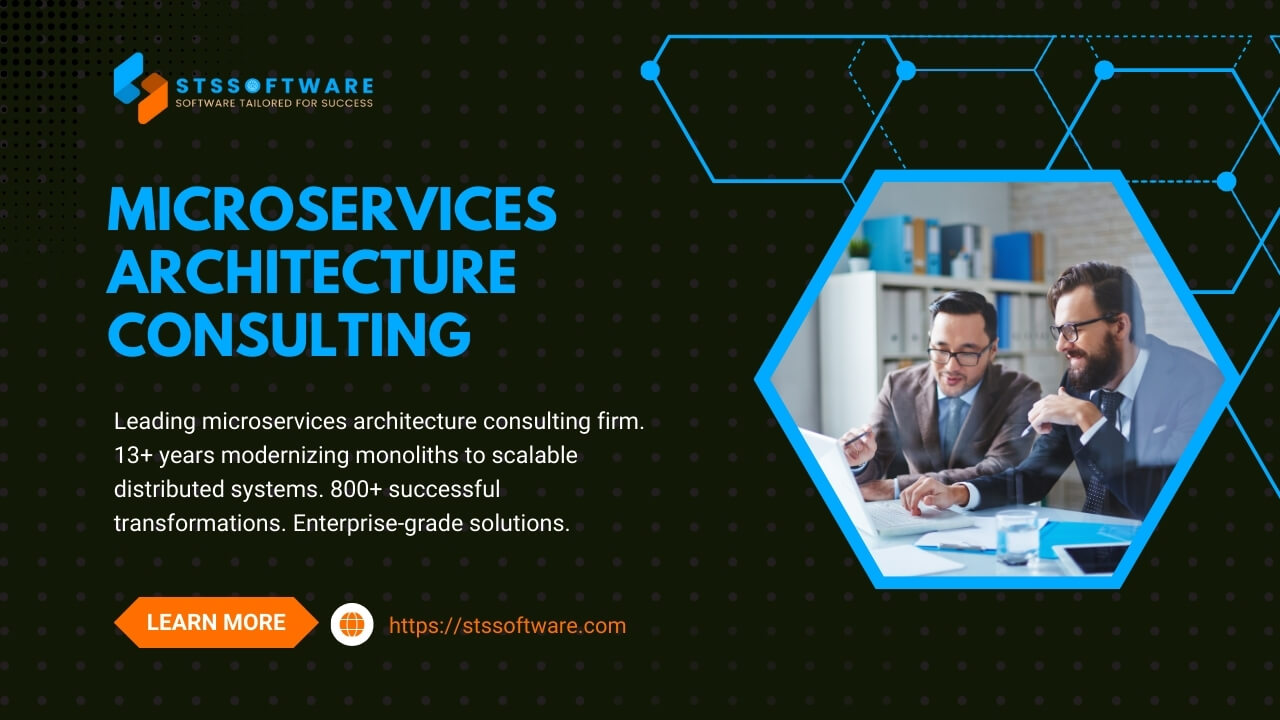Scale Rapidly, Reduce Coupling, Innovate Modularly
At STS Software, our microservices architecture consulting services empower businesses to transform monolithic systems into flexible, scalable architectures. With over 13 years of experience in software development, we guide you through decomposition, deployment, and ongoing evolution, ensuring your applications are resilient, agile, and ready for digital growth. Leverage our expertise in cutting-edge technologies to accelerate innovation and reduce time-to-market.
Why Microservices Architecture Consulting Matters
Traditional monolithic architectures—where all components are tightly integrated into a single codebase—often struggle to keep up with evolving business demands. Microservices architecture, on the other hand, breaks applications into independent, loosely coupled services that can be developed, deployed, and scaled individually. This shift toward distributed systems is driven by the need for greater flexibility in cloud-native environments, where trends like containerization and serverless computing dominate.
Clients turn to microservices for key motivations: unparalleled scalability to handle fluctuating loads, faster release cycles that enable continuous innovation, enhanced resilience against failures, and improved agility for adapting to market changes.
According to Gartner, by 2025, 85% of large enterprises will have adopted microservices as their primary architecture, reflecting a broader industry trend toward modular systems. Forrester’s 2025 cloud trends report highlights that multi-cloud adoption and AI integration are accelerating this shift, with organizations reporting up to 30% improvements in deployment speeds through microservices.
These statistics underscore how microservices not only optimize resource utilization but also foster innovation, as seen in reports from Atlassian and IBM, where companies achieve faster development cycles and competitive edges.
Contact us: Custom software development service
Challenges of Adopting Microservices (Pain Points)
While microservices offer significant advantages, adoption isn’t without hurdles. One major challenge is complexity in service decomposition: breaking down a monolith into granular services requires careful planning to avoid creating overly fragmented systems, leading to “microservices sprawl.” Data consistency and transaction management across services become tricky, as traditional ACID transactions give way to eventual consistency models, increasing the risk of data anomalies.
Inter-service communication introduces latency issues, with choices between synchronous (e.g., REST) and asynchronous methods complicating API versioning and error handling. Deployment orchestration demands robust CI/CD pipelines and tools like Kubernetes, but without proper setup, it can result in operational overhead. Monitoring and observability are critical yet challenging in distributed environments, where tracing failures across services requires advanced tooling.
Cultural and process changes also pose barriers, necessitating a shift to DevOps practices and team alignment around autonomous services. According to a 2025 Ops Level report, 62% of organizations cite managing inter-service dependencies as a top challenge. Security vulnerabilities, such as resource exhaustion from DDoS attacks, are heightened in microservices, with 28% of API-targeted attacks affecting financial services, as noted in Kong’s 2025 analysis. Over-engineering early on or neglecting automation can exacerbate these issues, turning potential benefits into costly pitfalls.
STS’s Microservices Consulting Services & Capabilities
At STS Software, we deliver comprehensive microservices consulting tailored to your business needs, drawing on our ISO 9001 and ISO/IEC 27001 certifications for quality and security.
Architecture Assessment & Readiness Analysis: We start by evaluating your current systems, identifying candidates for microservices migration through gap analysis and risk assessments. This ensures a smooth transition without disrupting operations.
Service Decomposition Strategy: Using domain-driven design (DDD) principles, we define bounded contexts and service boundaries. Techniques like feature-table clustering help segment functionalities effectively, minimizing coupling.
API & Communication Design: Our experts recommend synchronous (REST, gRPC) or asynchronous (messaging queues like Kafka) patterns, incorporating API gateways and service meshes for seamless integration.
Data Strategy & Patterns: We implement database-per-service models, sagas for distributed transactions, event sourcing, and CQRS to maintain data integrity across services.
CI/CD, Deployment & Infrastructure: Leveraging containerization with Docker and orchestration via Kubernetes, we build automated pipelines and infrastructure as code for efficient deployments.
Observability & Monitoring: We set up distributed tracing, logging, metrics, and alerting using tools like Prometheus and ELK Stack to provide real-time insights.
Resilience & Fault Tolerance: Strategies include circuit breakers, rate limiting, and bulkheads to enhance system reliability.
Governance, Versioning & Evolution: We manage API versions for backward compatibility and guide service retirement processes.
Training & Coaching: Hands-on workshops equip your teams with microservices best practices.
Ongoing Support & Evolution: Post-implementation, we assist with architecture evolution, new service onboarding, and refactoring.
Our Approach / Delivery Methodology
STS Software follows a structured, iterative approach to microservices consulting, ensuring alignment with your goals. Our phases include:
- Discover: Requirements gathering, stakeholder interviews, and current state analysis.
- Design: Architecture blueprinting with prototypes and patterns.
- Pilot: Implementing a proof-of-concept for validation.
- Build: Full-scale development with agile sprints.
- Operate: Deployment, monitoring, and continuous optimization.
We integrate flexibly with your teams—onsite, remote, or hybrid—using Agile methodologies for iterative delivery. Quality is maintained through architectural reviews, code audits, and automated testing, reflecting our commitment to excellence as a Microsoft Partner.
Technical Differentiators & Expertise
What sets STS Software apart is our deep expertise in technologies like Kubernetes for orchestration, Spring Boot for Java-based services, Node.js for lightweight APIs, and gRPC for high-performance communication. We specialize in patterns such as service mesh (e.g., Istio) and serverless architectures, aligning with 2025 trends like AIOps and cloud adoption from Ecosmob and AWS reports.
Unlike generic consultancies, our 350+ skilled engineers bring domain-specific knowledge from 800+ projects, including AI and cloud integrations. We offer proprietary accelerators for rapid decomposition and observability tooling, reducing implementation time by up to 40%. Our focus on resilience and governance ensures sustainable architectures, backed by partnerships and certifications.
Case Studies / Success Stories
Case Study 1: Skin Analyzing System for Healthcare Client
A leading healthcare provider approached STS Software to modernize their Skin Analyzing System, a monolithic application struggling with scalability during peak usage. We conducted an architecture assessment and decomposed it into microservices: one for image processing using computer vision, another for data analysis with machine learning, and a third for user interfaces.
Before: Frequent downtimes and slow updates. After: Modular services deployed on Kubernetes, with CQRS for data handling. Results included 50% faster deployment times, 3x scalability improvement, and 99.9% uptime. Challenges like inter-service latency were overcome with gRPC and circuit breakers.
(Before/After Diagram: Monolith block vs. interconnected services.)
“STS Software transformed our system into a scalable powerhouse,” said the client’s CTO.
Case Study 2: Semantic Search for Travel Platform
For a travel tech startup, we migrated their Semantic Search engine from a monolith to microservices. Using domain-driven design, we created services for natural language processing, intent detection, and result aggregation.
Before: High coupling led to slow iterations. After: Event sourcing and API gateways enabled independent scaling. Metrics showed 40% reduction in release cycles and improved query response by 60%. Data consistency issues were resolved via sagas.
(Before/After Diagram: Single app vs. distributed search modules.)
Partnering with STS was seamless,” noted the project manager, echoing testimonials from our 300+ global clients.
These align with success stories like Netflix’s migration, which inspired our resilient designs.
FAQs (Frequently Asked Questions)
When should a system move to microservices vs remain monolithic?
Opt for microservices when scalability, independent deployments, or team autonomy are priorities. Stay monolithic for simpler apps to avoid unnecessary complexity.
How do you handle data consistency across services?
We use patterns like sagas, event sourcing, and CQRS to ensure eventual consistency, tailored to your needs.
What’s the cost and timeline for a microservices initiative?
Costs vary by scope; timelines range from 3-6 months for pilots to 12+ for full migrations. Contact us for a software development service.
How do you ensure security, monitoring, and scalability in microservices?
Through service meshes, distributed tracing, and auto-scaling with Kubernetes, plus security best practices like rate limiting.
Do you offer training or knowledge transfer to internal teams?
Yes, our workshops and coaching sessions provide hands-on knowledge transfer for long-term success.
Why Choose STS Software for Microservices Consulting
With 13+ years of industry experience and 800+ successful projects, STS Software is your trusted partner for microservices consulting. Our 350+ skilled engineers specialize in domains like healthcare, retail, and finance, delivering innovative solutions certified by ISO 9001 and ISO/IEC 27001. As a Microsoft Partner, we ensure compliance and quality.
Our team of architects and distributed systems experts mitigates risks through thorough assessments and accountable delivery. Trusted by leading companies, we boast high client retention and testimonials like those from ISMS Global and DMI Global. Choose STS for expertise that drives efficiency, productivity, and digital transformation without compromise.



